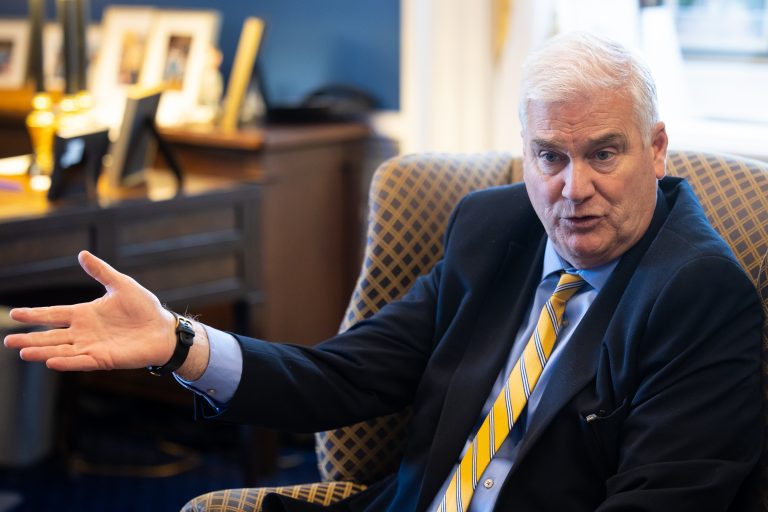House GOP leaders are waving off calls from rank-and-file Republicans for changes to their debt-limit proposal. Instead, they’re plowing ahead toward a floor vote this week, daring detractors to vote against it.
At least, that’s what House Majority Whip Tom Emmer is asserting. Meanwhile, a handful of GOP members have told POLITICO they are still privately demanding changes to the bill and, without them, will lean toward voting “no” on the plan. And Republican leaders only have four votes to spare.
“I was told it’s closed — it’s not getting changed,” Emmer said of the plan, noting that Speaker Kevin McCarthy has told him that there will be no last-minute adjustments to the measure.
“We will pass it this week,” the Minnesota Republican vowed. But, a handful of GOP members have told POLITICO they are still privately demanding changes to the bill and, without them, will lean toward voting “no” on the plan.
There’s no question it’s a fluid situation for GOP leaders; the conference is not exactly known for ideological harmony, and the margins they’re operating under are tight. Yet McCarthy and his team have been bullish about their ability to pass the massive debt measure this week, after months of internal deliberations with members about their expectations and concerns with the proposal.
And Republican leadership has a warning they hope will keep the conference in line: Failing to unite behind a debt plan will only empower President Joe Biden and the Democrats.
“Your choice is literally going to be, do you want to have a solution and avoid default? Or do you want to give Joe Biden and Chuck Schumer a blank check, with no fiscal reforms whatsoever?” Emmer said. “This is literally putting Republicans in charge of solving the debt ceiling.”
As for the GOP holdouts so far? Emmer argued that they would, ultimately, decide to back McCarthy’s goal of presenting a united front against Biden: “I think all those people understand this is a team effort.”
The list of possible GOP holdouts includes Reps. Nancy Mace (R-S.C.), Tim Burchett (R-Tenn.), Eli Crane (R-Ariz.), Andy Biggs (R-Ariz.), Thomas Massie (R-Ky.) and Chip Roy (R-Texas), according to people familiar with their thinking and public statements.
There are several sticking points in the plan — which would include across-the-board spending cuts and tightening access to government benefits for low-income people — that have rankled some in the GOP’s slim majority.
One member, granted anonymity to speak candidly and avoid endless whip phone calls, said they are currently a “no” vote because the plan doesn’t do enough to address debt reduction or immediately enact some of the stricter work requirements.
Meanwhile, vulnerable Republicans, especially those in districts Biden won in 2020, are dismissing those concerns posited by their more conservative colleagues. The elimination of certain tax breaks, in particular, is causing headaches for the GOP whip team. The plan would kill some clean-energy tax credits that were included in Democrats’ sprawling policy package last year, including financial incentives for biodiesel that Republicans in midwest states are now adamantly defending.
“The ethanol issue is real. It’s a tough vote for Midwest members,” said one House GOP lawmaker, who was granted anonymity to discuss internal conversations. The lawmaker noted GOP leaders and Emmer’s whip team have been talking to a handful of members “all weekend” who’ve raised concerns about the ethanol-related measures.
Midwestern Republicans with ethanol plants in their districts are especially worried — including Rep. Brad Finstad (R-Minn.), according to three people who were granted anonymity to discuss internal conversations. Finstad has worked to beat back strong GOP primary and Democratic challenges since he won a special election in 2022. Looking soft on ethanol gives both sides ample ammunition against him.
One of the people familiar with conversations said Finstad has raised serious concerns about the ethanol-related provisions, “but not to the point he’s a no.” A spokesperson for Finstad did not respond to a request for comment.
Emmer, for his part, noted that Republicans are already “on record voting against many of these tax credits in the Inflation Reduction Act,” as part of the GOP’s energy bill.
Senior Republicans say they expect to alleviate the ethanol concerns without changing any text, reminding members they‘ve already voted against the measures once. Other Republicans involved also say they’ve privately pointed out to concerned members that “this is a starting point and the odds are truly stacked against any of this stuff remaining throughout the process,” according to a second GOP House member.
But Republicans are quick to note that any lingering concern at this point threatens the legislation, and their negotiating stance, as they push for a final vote.
“We have a four-vote majority. I have concerns on everything,” the GOP lawmaker said.
If Republicans can successfully pass the debt measure this week, it’s a far cry from defusing the debt crisis altogether. McCarthy still needs to convince Biden and Democrats to come to the table — and both groups have already trashed the Republican proposal as a nonstarter. Any further negotiations that could actually earn Democratic support are sure to further rankle the House GOP.
But Republicans would still consider passing their own plan through the House a win, even if it’s just a first step.
McCarthy on Sunday stated confidently that they will be able to do it: “We will hold a vote this week and we will pass it,” he told Fox News’ Sunday Morning Futures. “I cannot imagine someone in our conference that would want to go along with Biden’s reckless spending.”



